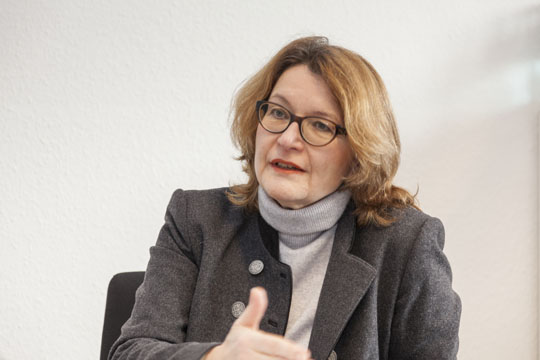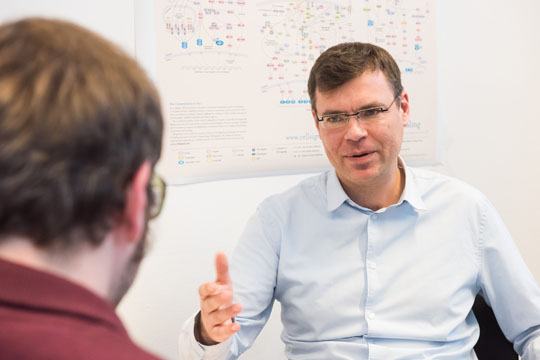Paths to academia
Freiburg, Mar 24, 2017
Better career path planning and perspectives beyond a professorship: These two ideas are central to the overall personnel development concept in academia that the University of Freiburg is developing at the moment. Nicolas Scherger reports on the approach for supporting next generation academic scholars and introduces a researcher who was one of the first to be given tenure at the University of Freiburg in 2009. In addition, an interview discusses the offerings the University provides to support young scholars.
"We want to encourage our young men and women in research to embark on academic careers; to show them the risks and opportunities that entails, and to accompany them on that journey," says Rector Professor Hans-Jochen Schiewer. A keen focus is placed on the postdoc phase. After establishing the International Graduate Academy and many Graduate Schools as part of a comprehensive infrastructure for doctoral candidates, the university now aims to increase its measures supporting the period following doctoral studies (see interview).
Tenure track is one of the key building blocks; aimed at postdocs, it provides for a direct transition into a full professorship following a successful probationary phase. The personnel development plan is part of the application the university will make to the German government program to promote junior researchers in June 2017. The program is set to finance 1000 new tenure track professorships across Germany. Freiburg has had tenure track professorships for eight years. "The clear advantage is that early in their careers, we can offer promising talents a path to full professorship, with their help and depending on their performance," says Schiewer. There are currently ten tenure-track professors at the University of Freiburg; five more have already transitioned into full professorships (see portrait). The university now plans to establish the "Freiburg model," which links heading a junior research group with a tenure track professorship - something which until now was only possible within the German Research Foundation's Emmy Noether Program.
The university is also planning to make it easier to create unlimited-term jobs which will be an attractive alternative to a professorship. "We aim to develop new staff categories which young researchers will not regard as a 'failure' in the attempt to become a professor, but will define as their career goal," Schiewer explains. Possible models include that of lecturers, who will primarily teach; academic managers, who will take on leading functions in faculties, academic centers, and in other institutions; and Core Facility managers to oversee technology platforms and major instrumentation.
But the university is not thinking about only academic careers. At the start of 2017, the Rectorate launched a new staff development office to manage a comprehensive personnel development plan including the academic support staff.

On the way up: An academic career is attractive. The University of Freiburg is finding ways of supporting and keeping rising talent.
Photo: Jürgen Gocke
Promoting women in research
Professor Gisela Riescher, Vice-President for Research Integrity, Gender and Diversity, describes University of Freiburg measures to support rising female researchers.
Professor Riescher, why is it important to provide special support to young women researchers?
Gisela Riescher: Some 25 years ago there were 3.7 percent women professors in Freiburg; today, thanks to a great deal of work in equal opportunities and the promotion of women, it's nearly 25 percent. But we can't afford to wait another 25 years before it's 50 percent. We must continue to make every effort in equal opportunities policy. We need to pay special attention to the postdoc phase following the PhD. That is the time when many women abandon their academic careers - for reasons including the uncertainty of career prospects and because they want a family.
How does the University of Freiburg help in that phase?
We have overhauled two formats in particular. We have raised the amount of our bridging scholarship "STAY!" and we have expanded our target group to international women researchers and German women researchers who've worked abroad with "Come and STAY!" In parallel we offer a coaching program in which professional, specially selected coaches advise and support individual women researchers. In addition the university takes part in external formats such as the state of Baden-Württemberg's Brigitte-Schlieben-Lange Program and the Margarete-von-Wrangell postdoc program.
Ideally that is followed by a professorship. How can we ensure fair appointments procedures regarding gender?
A central aspect are our appointments guidelines, which are binding. The Equal Opportunity Representative plays an important role in the appointments procedure; there are more women on the appointments board than there used to be, and there are equal numbers of men and women among the external reviewers. There is a principle that we promote equal opportunities - that means that, given equal qualifications and performance, the woman researcher will be preferred.
What message would you like to send to young women researchers as they move towards an academic career?
I would tell them they have made a good decision. Being a professor is one of the best careers. Where else can you choose so freely to work on issues which interest you and which are important to society? They should do everything they can to stick with it, get advice from experienced colleagues of both sexes, and not be discouraged by setbacks; instead, they should be motivated by the many positive moments.
 One of the innovations launched by Vice-President Gisela Riescher - a coaching program for young women researchers.
One of the innovations launched by Vice-President Gisela Riescher - a coaching program for young women researchers.
Photo: Ingeborg Lehmann
Contact STAY! and Coaching Program
Mariana Vargas Ustares
Gender and Diversity Office
Phone: 0761/203-9053
Email: mariana.vargas-ustares@zv.uni-freiburg.de
Freiburg's tenure-track pionier
Six years of writing a postdoc habilitation thesis with no prospect of a professorship - that was not an option for Stefan Günther. Nevertheless, he decided to stick with academia and not to go into industry. And that is due to a new model for which he was the pioneer. In 2009 he was appointed to the University of Freiburg's first tenure-track professorships. He now recommends this path to other young researchers. "If you turn in good work, you have long-term perspectives at your university," says Günther. He has been Professor of Pharmaceutical Bioinformatics since 2015.
Those who start as tenure-track professors have their work cut out - research and publications, heading a working group, teaching classes, managing staff, applying for grants, and maintaining academic self-management. Yet, he says, all those tasks are valuable; "It is very good preparation for what you will later face as a full professor." But he says all the time he had to take for administration he would rather have spent on research; the services of a secretary would have been helpful. But he stresses that his academic work did not suffer. "I enjoyed being responsible for my own research," he says.
Does this model really offer more security - when you have to successfully get through two evaluations? Günther says yes - "It's up to me whether my performance is up to scratch or not." Yet when he started, it was not yet clear what the criteria for assessment would be. "The Rectorate set out guidelines, regulating the process before my interim evaluation." In a classic road-to-professorship model, you can't be appointed at the institution you studied at. "Even if you do everything right in your postdoc qualification, you could be certain you had no prospects at your own university." That means that even outstanding researchers - if they are unable to get a professorship elsewhere - are forced to leave the academic path quite late in their careers. Günther says it's better to set the course earlier - by competing for a tenure-track professorship.
Stefan Günther is grateful to his faculty colleagues, saying "I had the feeling from the start that I was accepted as a full member." He advises researchers who take this path to take on the job with confidence, to represent the interests of tenure-track professors in the committees, and to develop their own research profile. "You don't have to listen to everyone; you can decide carefully for yourself which advice to take. And then it is a lot more fun."

Greater career certainty, independent research - for Stefan Günther, these were the biggest advantages of a tenure-track professorship.
Photo: Klaus Polkowski

